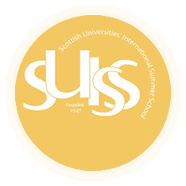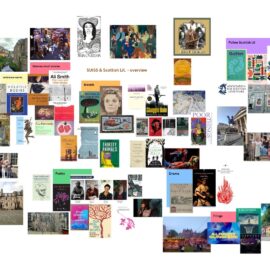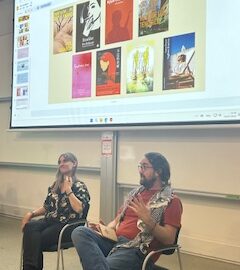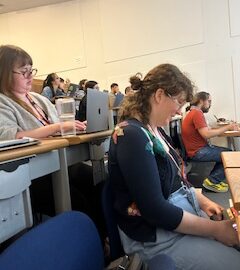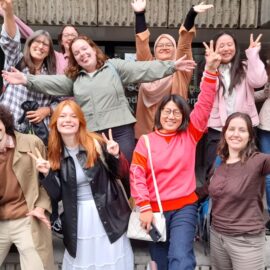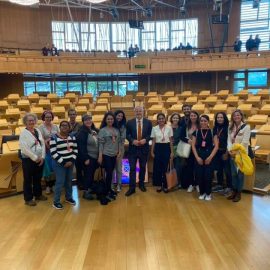Thanks to the generous support of Creative Scotland, we were able to welcome Maria Munoz (Spain) and Petra Pugar (Croatia), two talented translators, to our Contemporary and Scottish Literature courses this summer. As in previous years, a key component of the Fellowship is for our translators to deliver presentations on their practice as part of our Translation Showcase event, which takes place in August. This year the event took place at the University of Edinburgh, and we’re very pleased to be able to share Maria’s and Petra’s presentations here for those that missed the event. We hope you find their presentations as illuminating and entertaining as did.




Petra Says:
The fellowship allowed me to fully immerse myself in the Text and Context program, which proved to be transformative for both my professional journey as a literary translator, and my academic path. The program’s rigorous and stimulating environment enabled me to make final notes for my PhD research on the intermediality of text, space, and image in the work of Alasdair Gray. Engaging with peers and experts in the field, including the SUISS staff, I received insightful feedback that will significantly shape the final stages of my dissertation.
However, perhaps the most fulfilling aspect of my time at SUISS was the opportunity to give a presentation on the challenges and intricacies of translating Douglas Stuart’s novels Shuggie Bain and Young Mungo into Croatian. Sharing my experiences with fellow participants and seeing how my work piques their interest in literary translation was incredibly rewarding on a professional and personal level. The discussions that preceded and followed my presentation opened up new perspectives and underscored the importance of cultural and linguistic exchange in literary translation as an inseparable part of world literature, which I am proud to contribute to.
The SUISS program also provided an exceptional platform for networking and collaboration. I had enriching conversations with mentors and fellow translators from around the world, which have already led to potential future collaborations I am very much looking forward to. Moreover, the program’s focus on both academic rigor and cultural immersion contributed to my continuous exploration of Scotland as a literary, cultural and physical space, which will undoubtedly inform my future translations and scholarly work.
As I move forward in my career, I am committed to promoting Scottish literature in Croatia and the surrounding region, to reach a better cultural understanding that goes beyond surface-level stereotypes. The fellowship has not only enhanced my skills but also deepened and renewed my passion for this endeavour. I look forward to continuing my efforts to introduce more Scottish authors to Croatian readers, contributing to a greater understanding and appreciation of Scotland’s complex and varied literary heritage.
Translating Shuggie Bain
Maria Says:
For 4 weeks, we delved into the intricacies of Contemporary and Scottish Literature, guided by our wonderful lecturers and tutors.
I expanded my knowledge and got introduced to a wide range of authors such as Ali Smith, Edwin Morgan, Liz Lochhead, Jackie Kay, Douglas Stuart, Alasdair Gray or Harry Josephine Giles, to name some of my favourites. I also learned about concepts such as the Caledonian Antisyzygy and was marvelled by plays such as The Cheviot, the Stag and The Black Black Oil by John McGrath, which, despite being written decades ago and mainly shedding light over the Highland Clearances, it stood as wildly relevant to me nowadays.
As for the future, I’m planning to use this renovated energy to contact several publishers in Spain. Hopefully, my experience and passion will convince them to bring great Scottish authors closer to Spanish audiences, who have more in common that we could expect. In the past, Spanish publishing houses such as Impedimenta, Capitán Swing, Galaxia, and Automática have successfully signed translation contracts thanks to the Translation Fund administered by Publishing Scotland on behalf of Creative Scotland, so I’m committed to adding more to the list.
To sum up, this was such a rewarding experience which I would recommend to anyone. In an era of individualism and automatism, thank you for bringing humanity, collective effort and the arts into focus. Thank you for considering the role translators play in this, too, and help us bridge the gap between cultures.
Inclusive language in translation
Biographies:
Maria Munoz is a freelance translator from English and French into Spanish specialized in literary and medical translation. She studied Translation and Interpreting at University of Alicante and French literature and translation at University of Aberdeen. She has translated authors such as Jessica Mary Best and Nicola Sanders and is interested in the intersection of translation with queer and gender studies.
Mar’s presentation is on inclusive translation, especially in relation to queer and feminist literature, and the supposed neutral role of the translator.
Petra Pugar: My translation experience started with contract work for various literary festivals in Croatia and a collaboration with the Croatian National Television as a translator and subtitler of documentaries, films and children’s shows, which provided me with the necessary skills and courage to move on to translating works of literature for the most respectable publishing houses in Croatia, such as Fraktura, Znanje, Vorto Palabra etc. In addition to this, I worked for two and a half years as a literary agent at Corto Literary Agency, representing international agencies and publishers such as Blake Friedmann, Ullstein Verlag, Norstedts and Penguin Random House Spain for the territory of South-East Europe, simultaneously working on the promotion and visibility of Croatian authors abroad by regularly
visiting the most important book fairs, primarily the ones in London and Frankfurt. This experience
broadened my understanding of the publishing industry and brought me out of the academic bubble. It
also presented me with an opportunity for me to network with numerous publishing professionals not
only in Croatia and the region, but in the English-speaking world as well.
I have since become a full-time self-employed translator, but I still maintain those contacts and I have
access to conversations about publishing profiles and selection of titles, which is what, I believe,
makes me an excellent promotor of Scottish Literature in my area. Additionally, as a literary
translator and scholar who has read numerous Scottish authors, I have successfully presented some of
them to my publisher and suggested myself as a translator. I translated Douglas Stuart’s two novels,
but my wish is to achieve a translation of Alasdair Gray, who is my main focus of research, and
whose recent death was a great loss for the world literature. Other authors that deserve a Croatian
translation, and as of yet have little to none (with exceptions such as Ali Smith), are Edwin Morgan,
Janice Galloway, Jackie Kay, and Liz Lochhead.
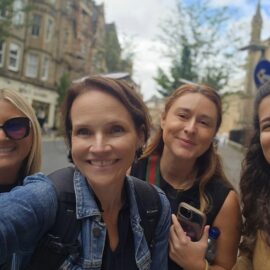 I can’t express how truly incredible the SUISS International Creative Writing Course was. It was a once in a lifetime opportunity that will live in my heart forever. This four-week experience in Edinburgh was nothing short of transformational.
I can’t express how truly incredible the SUISS International Creative Writing Course was. It was a once in a lifetime opportunity that will live in my heart forever. This four-week experience in Edinburgh was nothing short of transformational.